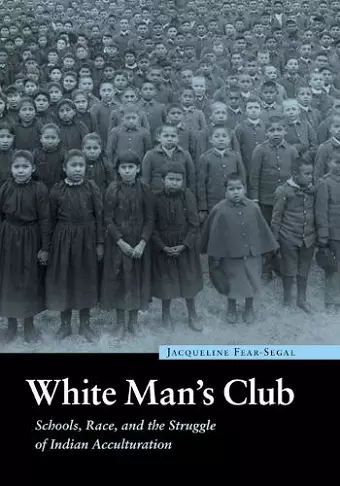White Man's Club
Schools, Race, and the Struggle of Indian Acculturation
Format:Paperback
Publisher:University of Nebraska Press
Published:1st Jul '09
Should be back in stock very soon

An in-depth analysis of American Indian schooling and acculturation in the late nineteenth century
In this volume, schools for Native children are examined within the broad framework of race relations in the United States for the first time. Jacqueline Fear-Segal analyses multiple schools and their differing agendas and engages with the conflicting white discourses of race that underlay their pedagogies.Tens of thousands of Indian children filed through the gates of government schools to be trained as United States citizens. Part of a late-nineteenth-century campaign to eradicate Native cultures and communities, these institutions became arenas where whites debated the terms of Indian citizenship, but also where Native peoples resisted the power of white schooling and claimed new skills to protect and redefine tribal and Indian identities. In White Man’s Club, schools for Native children are examined within the broad framework of race relations in the United States for the first time. Jacqueline Fear-Segal analyzes multiple schools and their differing agendas and engages with the conflicting white discourses of race that underlay their pedagogies. She argues that federal schools established to Americanize Native children did not achieve their purpose; instead they progressively racialized American Indians. A far-reaching and bold account of the larger issues at stake, White Man’s Club challenges previous studies for overemphasizing the reformers’ overtly optimistic assessment of the Indians’ capacity for assimilation and contends that a covertly racial agenda characterized this educational venture from the start. Asking the reader to consider the legacy of nineteenth-century acculturation policies, White Man’s Club incorporates the life stories and voices of Native students and traces the schools’ powerful impact into the twenty-first century. Fear-Segal draws upon a rich array of source material. Traditional archival research is interwoven with analysis of maps, drawings, photographs, the built environment, and supplemented by oral and family histories. Creative use of new theoretical and interpretive perspectives brings fresh insights to the subject matter.
"A rich and rewarding book."—Michael C. Coleman, Great Plains Quarterly
"Fear-Segal imaginatively examines the ominous racialization of American Indians in the nineteenth and twentieth centuries through a focus on the covertly racial agenda of boarding school policy. . . . White Man's Club's sophisticated but readable style will engross any reader."—Sally McBeth, Western Historical Quarterly
"With the publication of Jacqueline Fear-Segal's White Man’s Club, the historiography of Indian residential schooling has reached a new level of sophistication."—John Milloy, Journal of American History
“Perhaps only once in a decade does a book come along that truly sets the standard for the rest of the field. White Man’s Club is such a book. Beautifully written and superbly argued, it is replete with fresh insights and analysis of a subject that remains one of the most enduring and meaningful and often painful in the history of American Indian and white relations. Students of the Indian boarding school movement will be especially interested in the insights provided by Fear-Segal, particularly those that address how the dominant nineteenth century views of race played a major role in the creation and functioning of off-reservation boarding schools.”—Journal of the West
"White Man's Club is a well-constructed and well-researched book that originally uses primary sources to unveil the convert agenda of race subjugation and control in the government schooling system and its impact on students' lives."—Marinella Lentis, Wicazo Sa
"By including Native voices, Fear-Segal's study reminds us that the Native experience in America is not an academic exercise but involves people's cherished memories and present realities."—Ruth Spack, American Historical Review
"White Man's Club provides a thought-provoking reinterpretation of the federal Indian Education Program's formative years and a thorough overview of the beliefs and actions of significant policy reformers, as well as the life histories of many Native students and leaders."—C. Joseph Genetin-Pilawa, Ethnohistory
"Perhaps only once in a decade does a book come along that truly sets the standard for the rest of the field. White Man's Club is such a book. Beautifully written and superbly argued, it is replete with fresh insights and analysis of a subject that remains one of the most enduring and meaningful and often painful in the history of American Indian and white relations."—Cary C. Collins, Journal of the West
“With extraordinary insight and grace, Jacqueline Fear-Segal has made a major contribution to the literature on one of the most important and devastating chapters in Indian-white relations. Both immensely illuminating and haunting, this book should be read by anyone interested in the history of U.S. race relations.”—David W. Adams, author of Education for Extinction: American Indians and the Boarding School Experience, 1875–1928
"Fear-Segal knows her topic well and she invites readers into the Carlisle Indian Industrial School, Dakota Mission, Santee Normal Training School, and other similar institutions to illuminate issues of race. . . . Her use of biography and autobiographies of Indians and non-Indians alike is a strong contribution of the book, and her careful reading of these sources provides a fresh look at familiar participants in the Indian school system."—Clifford Trafzar, American Studies Journal
ISBN: 9780803227880
Dimensions: unknown
Weight: 635g
412 pages